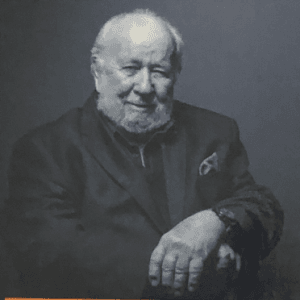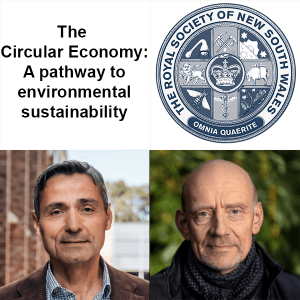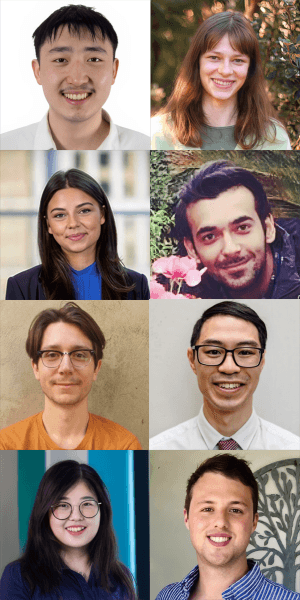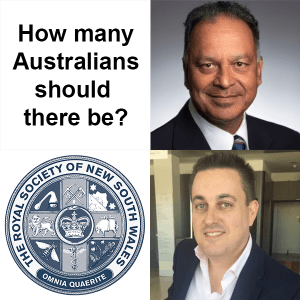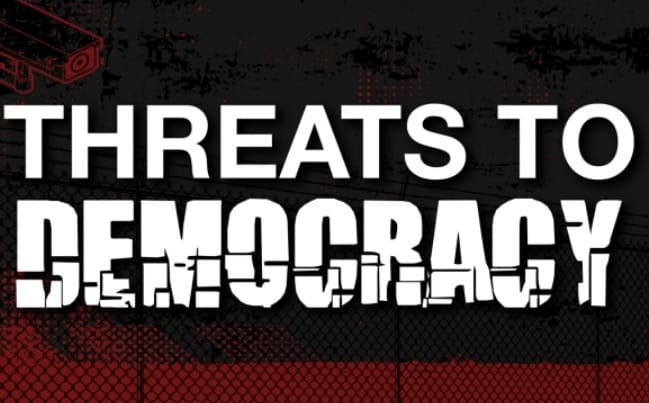
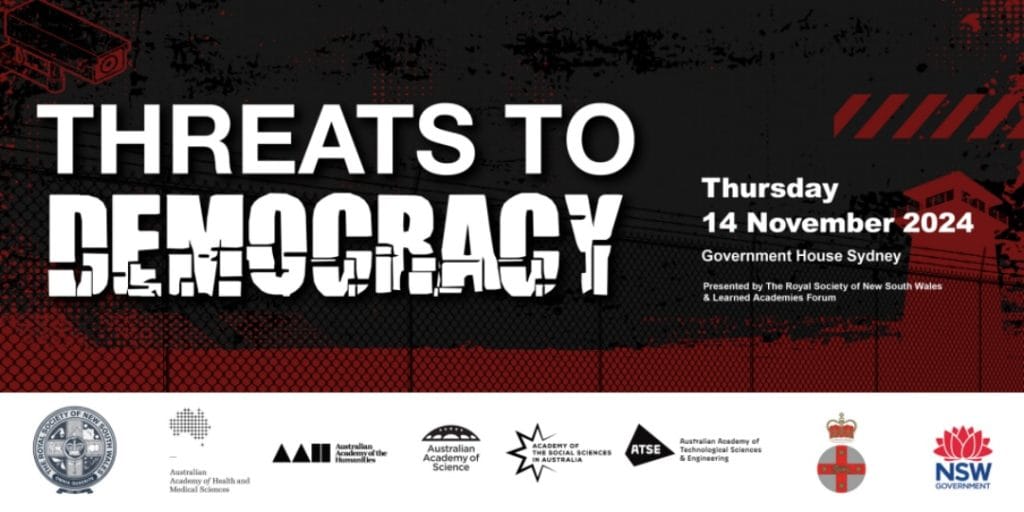
Date: Thursday, 14 November 2024, 8.30 for 9.00 am–5.00 pm AEDT
Venue: Government House Sydney: in person, by invitation, and live-streaming
Video presentations: YouTube playlist
Program: Brochure (6.5 MB pdf)
Entry: No charge
SUMMARY
In 2024, the greatest number ever will have voted in ‘democratic’ elections, in Argentina, India, Indonesia, Mexico, the UK, the USA, and others. At the same time, there have been deep questions about the success of democracies. As the Economist put it on February 14th:
This year’s democracy index shows that only 43 of the more than 70 elections are expected to be fully free and fair…. The latest report shows that less than 8% of the world’s population live in full democracies.
Is democracy important in the twenty-first century and if so, why? From its Greek origins, through Roman republican models to the many and varied structures of contemporary states, democracy has mutated but survived. In the much-quoted phrase of Winston Churchill from 1947:
‘Many forms of Government have been tried and will be tried in this world of sin and woe. No one pretends that democracy is perfect or all-wise. Indeed it has been said that democracy is the worst form of Government except for all those other forms that have been tried from time to time .…’
Democracy as a political framework has been influential in creating the global rules-based order that has dominated international affairs for half a century. Now the presuppositions of the rules-based order are in question and democracy itself is under threat. Attitudes to democracy and political power have changed and the nature and structures of political communities are in flux.
Pressure on that order comes from many directions. Global issues such as shifts in political power, the rise of economic inequity and the impact of climate change have reignited national divides and undercut commitment to democratic process. Within Australia, faith in politicians, political parties and the political process is reducing. What is a modern democracy, and how does a multicultural society such as Australia find common voices and policies across differences?
Technologies, from medical advances to artificial intelligence, undermine assumptions about individual freedom and choice. What does it mean to be able to choose a candidate or a government, when personal choice itself can be invisibly influenced? What is personal identity in the new world of biotech? And what can we do about the undermining of privacy– can regulation help? Is the new landscape of media undermining our democracy or simply altering its lineaments? Can we educate for democracy in the digital world? The Forum addresses these issues.
The Forum is held under the auspices of Her Excellency the Honourable Margaret Beazley AC KC, Governor of New South Wales. The Royal Society of New South Wales acknowledges the generous support of Her Excellency and the Office of the NSW Chief Scientist and Engineer.
OPENING SESSION
| Time | |
| Registration and Guests seated | |
| 9.00–9.20 am | Official Opening Her Excellency the Honourable Margaret Beazley AC KC |
| Welcome and Acknowledgements Dr Susan Pond AM FRSN FTSE FAHMS |
KEYNOTE SESSION
Chair
Emeritus Professor Christina Slade FRSN FRSA
Chair, Forum and Program Committees
Royal Society of New South Wales
| 9.20–10.30 am | Professor Philip Pettit AC FASSA FAHA FAAAS L S Rockefeller University Professor of Politics and Human Values Princeton University Democracy: the what, the why, and the how (Handout) What is democracy? A popular system of control over government that guards, as in classical Athens and republican Rome, against any governing body or official being able to act as they will. Why is it attractive? To the extent to which it is successful, it will provide those who are disappointed in some government policy or law with a (defeasible) reason to regard its selection as just tough luck, not a sign that they or theirs are lacking in status. How it is to be organised? Not monocentrically, with an elected party or potentate enjoying a monopoly of authority and power: that allows autocracy, as we know. Rather polycentrically, with institutions to allow the election of domain-general legislators and administrators, the checking and balancing of those officials by relatively independent domain-specific authorities (judges, inspectors, auditors, statisticians, election commissioners etc), and the exposure of both to free and informed contestation by ordinary individuals and by citizen associations and assemblies. |
BREAK (10.30–11.00 am)
PANEL SESSION 1: GLOBAL CHALLENGES TO DEMOCRACY
Chair
Mr Peter Varghese AO
Chancellor
University of Queensland
‘Global Challenges to Democracy’ explores the impact of global political, economic and environmental challenges on democratic nations and governance.
| 11.00–11.55 am | Emeritus Professor Hugh White AO FASSA Emeritus Professor of Strategic Studies School of International, Political and Strategic Studies Australian National University |
| Professor Deborah Cobb-Clark AO FASSA Deputy Head (Research), School of Economics University of Sydney | |
| Professor Quentin Grafton FASSA Professor of Economics and ARC Laureate Fellow Crawford School of Public Policy Australian National University |
PANEL SESSION 2: CHALLENGES TO AUSTRALIAN DEMOCRACY
Chair
Emeritus Professor Peter Shergold AC FRSN FASSA
Vice-President
Royal Society of New South Wales
‘Challenges to Australian democracy’ focuses on Australian attitudes towards our democratic processes and attempts to strengthen our democracy.
| 12.00–12.55 pm | Ms Leila Smith Chief Executive Officer Aurora Foundation |
| Ms Jeni Whalan First Assistant Secretary and Head, Strengthening Democracy Taskforce Department of Home Affairs, Australian Government | |
| Mr Nick Bryant Author and former Journalist |
BREAK (12.55–2.00 pm)
PANEL SESSION 3: TECHNOLOGICAL CHALLENGES TO DEMOCRACY
Chair
Professor Sally Cripps FRSN
Director, Technology
Human Technology Institute
University of Technology Sydney
‘Technological challenges to democracy’ ranges from medical technology to artificial intelligence, asking whether they undermine assumptions of individual freedom and choice.
| 2.00–2.55 pm | Professor Ed Santow FAAL Director, Policy and Governance Human Technology Institute University of Technology Sydney |
| Associate Professor Fatemeh Vafaee School of Biotechnology and Biomolecular Sciences UNSW Sydney | |
| Dr Darren Saunders NSW Deputy Chief Scientist and Engineer |
PANEL SESSION 4: CHALLENGES TO THE PUBLIC SPHERE
Chair
Emeritus Professor Christina Slade FRSN FRSA
Chair, Forum and Program Committees
Royal Society of New South Wales
‘Challenges to the public sphere: educating for democracy’ looks to the future—how do we protect privacy, undermine disinformation and educate the young for social media.
| 3.00–3.55 pm | Ms Carly Kind Privacy Commissioner Office of the Australian Information Commissioner |
| Professor Catharine Lumby Foundation Chair, Media and Communications University of Sydney | |
| Professor Amanda Third Co-Director, Young and Resilient Research Centre Western Sydney University |
PANEL SESSION V: PANEL CHAIRS’ REPORT AND OPEN DISCUSSION
Chair
The Hon. Michael Baird AO
Chief Executive Officer
Susan McKinnon Foundation
| 4.00–5.00 pm | Mr Peter Varghese AO Emeritus Professor Peter Shergold AC FRSN FASSA Professor Sally Cripps FRSN Emeritus Professor Christina Slade FRSN FRSA |
CLOSE
| Royal Society of New South Wales | |
| Date: | Thursday, 14 November 2024, 09:00 AM |
| Venue: | |
| Entry: | No charge |
In Person Event
All are Welcome

